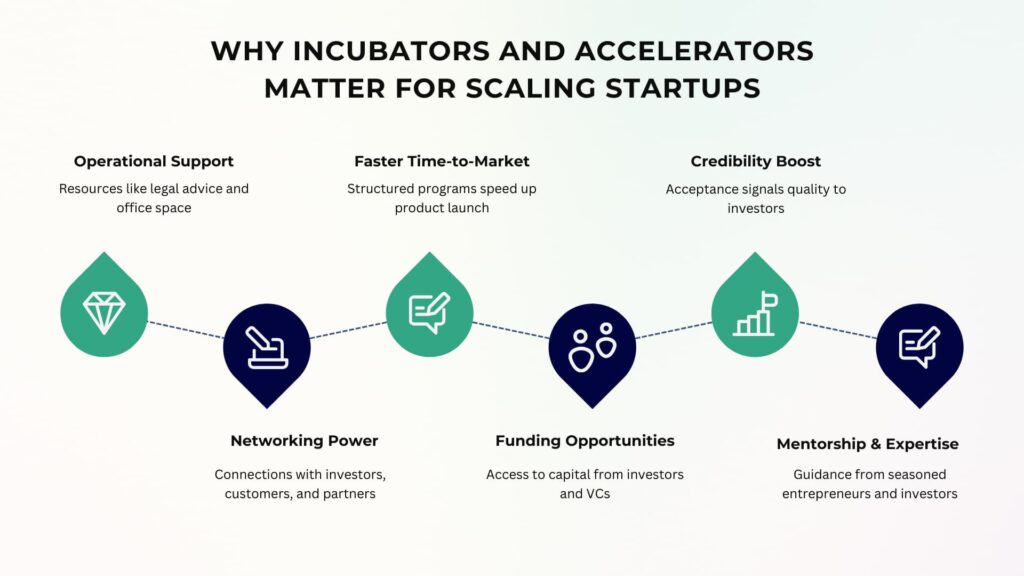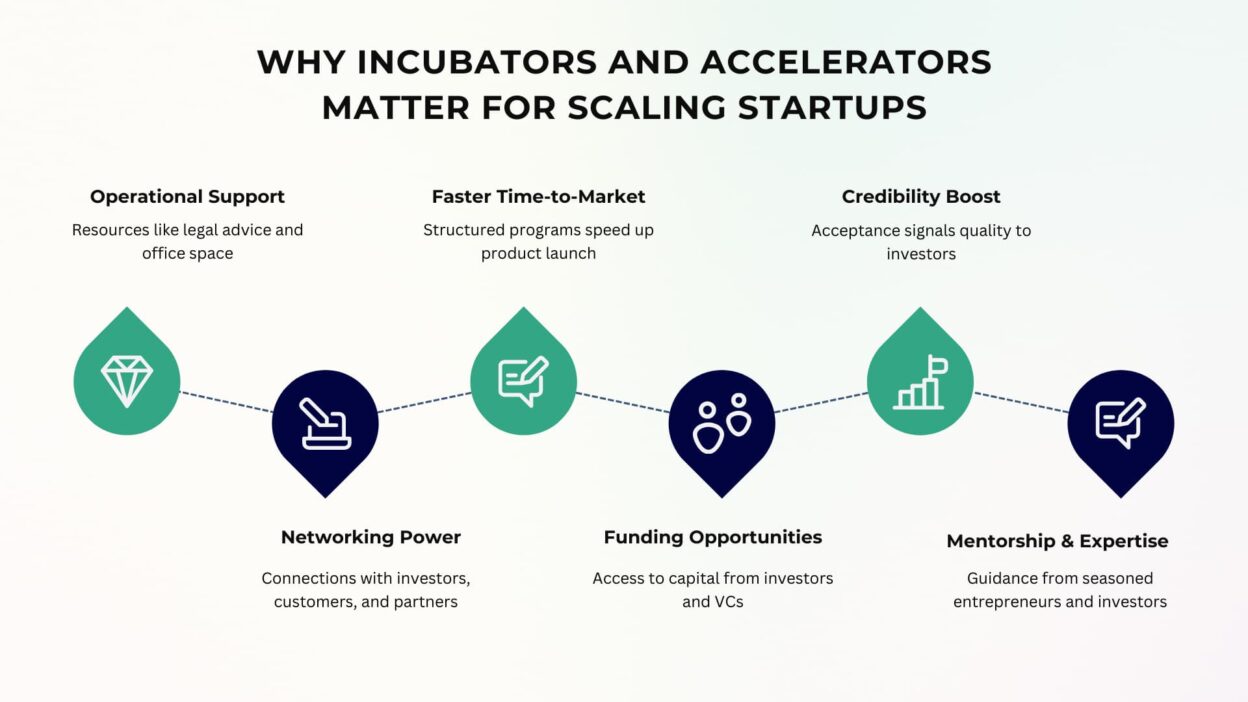Launching a startup is exciting—but also overwhelming. From refining an idea to finding the right investors, building a team, and scaling operations, entrepreneurs face a long list of challenges. While passion and grit matter, startups often need external support to move from a bright idea to a sustainable business.
That’s where incubators and accelerators step in. These organizations have become essential parts of the global startup ecosystem, providing mentorship, funding, resources, and networks that can fast-track growth.
Whether you’re a first-time founder or a seasoned entrepreneur exploring new ventures, understanding how incubators and accelerators work can help you decide if they’re the right stepping stone for your startup journey.
In this blog, we’ll explore what incubators and accelerators are, their key differences, how they help startups scale, real-world success stories, and tips for choosing the right program.
What Is a Startup Incubator?
A startup incubator is like a nurturing environment for early-stage businesses. Think of it as a greenhouse where young plants get the right soil, sunlight, and water until they’re ready to face the real world.
Incubators typically:
- Work with very early-stage startups, often pre-revenue.
- Provide office space, business mentoring, and technical resources.
- Help refine business models, test product-market fit, and validate ideas.
- Offer access to a network of investors, partners, and industry experts.
What Is a Startup Accelerator?
A startup accelerator, on the other hand, is like a bootcamp for startups ready to grow fast. Accelerators focus on companies that already have a minimum viable product (MVP) and are looking for rapid expansion.
Accelerators typically:
- Run fixed-term programs (often 3–6 months).
- Provide seed funding in exchange for equity.
- Offer structured mentorship, workshops, and investor introductions.
- End with a demo day, where startups pitch to a room full of investors..
Incubator vs Accelerator: Key Differences
While both provide valuable support, incubators and accelerators serve different stages of the startup journey. Here’s a quick comparison:
| Feature | Incubator | Accelerator |
| Stage of Startup | Early-stage (idea/pre-revenue) | Growth-stage (MVP, revenue-ready) |
| Program Duration | Flexible, ongoing support | Fixed-term (3–6 months) |
| Funding | May not provide direct funding | Usually seed funding in exchange for equity |
| Focus | Nurturing and building foundation | Rapid scaling and investor readiness |
| Structure | Less structured, long-term guidance | Highly structured, intense mentorship |
| Outcome | Refined business model, validated product | Fundraising, scaling, market expansion |
Why Incubators and Accelerators Matter for Scaling Startups

Scaling a startup isn’t just about having a great idea—it’s about execution, timing, and connections. Here’s how incubators and accelerators make a real difference:
1. Mentorship and Expertise
Founders gain access to seasoned entrepreneurs, industry veterans, and investors who provide guidance. Avoiding common mistakes early on can save years of trial and error.
2. Funding Opportunities
Accelerators often provide initial capital, while incubators connect startups with angel investors and venture capitalists. These funds are crucial for building teams, marketing, and product development.
3. Networking Power
Both programs open doors to networks of investors, potential customers, and partners. For many founders, these introductions are worth more than the funding itself.
4. Credibility Boost
Being accepted into a top incubator or accelerator signals quality to investors. It shows your idea has been vetted by industry experts, making fundraising easier.
5. Faster Time-to-Market
With structured programs, startups can move faster—turning an idea into a revenue-generating product in months rather than years.
6. Operational Support
From legal advice and office space to marketing support, these programs provide resources that founders may not afford independently.
How to Choose the Right Program for Your Startup
Not every incubator or accelerator is the right fit. Here are some factors to consider before applying:
1. Stage of Your Startup
- If you’re still refining your idea, an incubator is better.
- If you have traction and want to scale, an accelerator is ideal.
2. Program Reputation
Look for programs with strong alumni networks and successful case studies in your industry.
3. Funding Terms
Accelerators often take equity—make sure you’re comfortable with the trade-off.
4. Mentorship Quality
The value of these programs largely depends on the mentors. Research their backgrounds and expertise.
5. Location and Industry Focus
Some incubators and accelerators specialize in specific industries (fintech, healthtech, clean tech). Choose one aligned with your vision.
Global Landscape of Incubators and Accelerators
Startup ecosystems worldwide are booming. Here’s a quick look:
- North America: Silicon Valley remains the epicenter, with Y Combinator, Techstars, and 500 Global leading the way.
- Europe: Programs like Seedcamp and Station F in Paris support diverse startups.
- Asia: India, Singapore, and China have thriving accelerator networks like GSF Accelerator and Chinaccelerator.
- Middle East & Africa: Government-backed programs are fueling local innovation, such as Flat6Labs in Egypt and Saudi Arabia.
The Future of Startup Incubation and Acceleration
As technology evolves, so will incubators and accelerators. We’re likely to see:
- AI-driven mentorship, matching startups with the best advisors.
- Specialized programs for niche industries like biotech, climate tech, and Web3.
- Hybrid models, combining incubation and acceleration to support startups across all stages.
- Global collaboration, with cross-border programs helping startups scale internationally.
Final Thoughts
Building a startup is tough, but you don’t have to do it alone. Incubators and accelerators provide the tools, mentorship, funding, and networks that can transform an idea into a thriving business. The key is choosing the right program that fits your stage, industry, and long-term goals.
If you’re serious about scaling your startup, exploring these programs could be the smartest move you make. Remember, the journey of companies like Airbnb, Dropbox, and Reddit all started in these very environments—and yours could be next.



